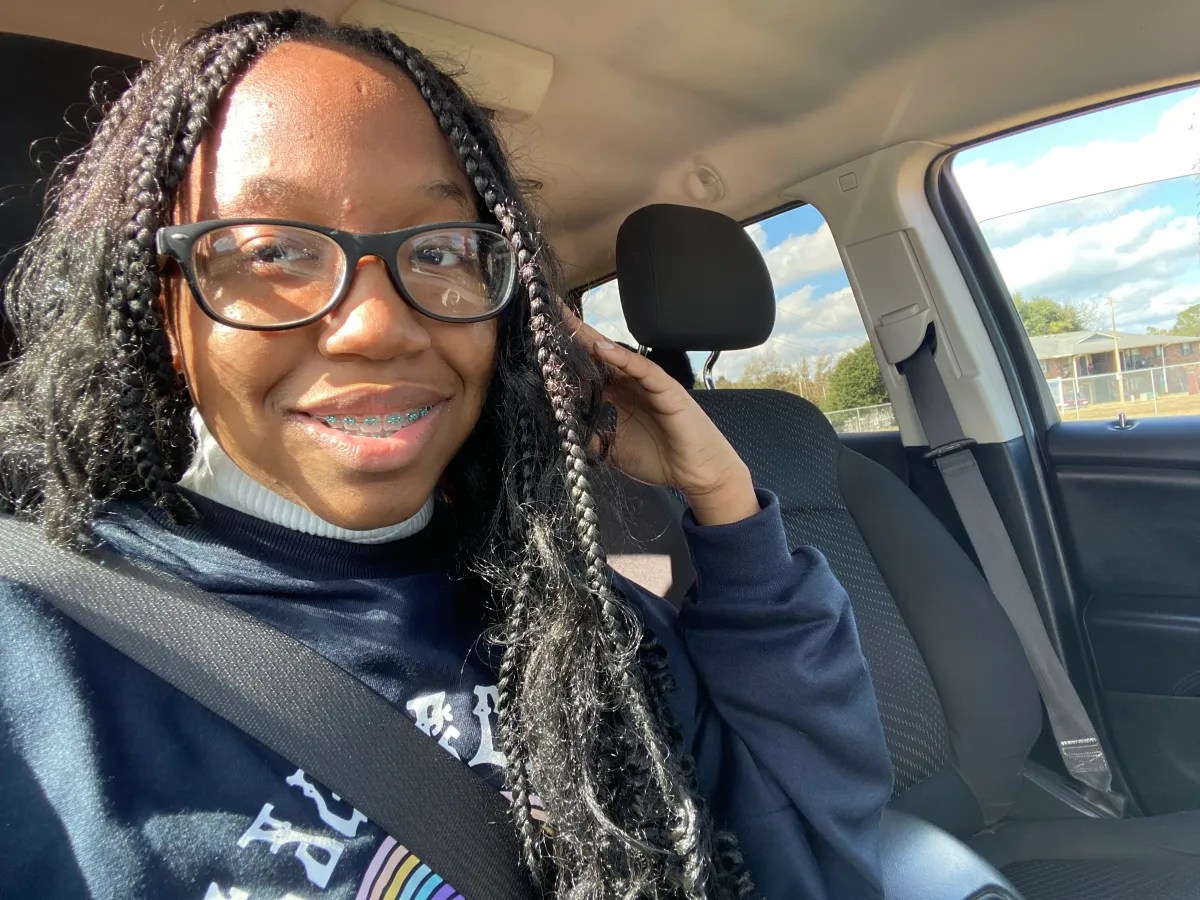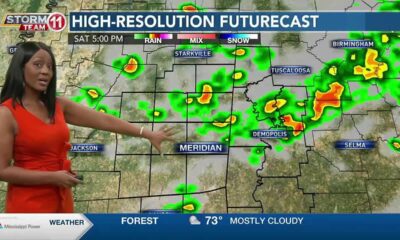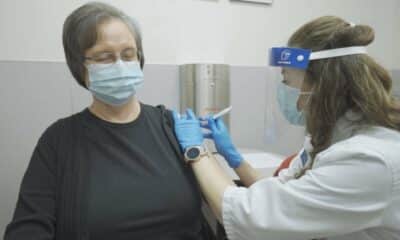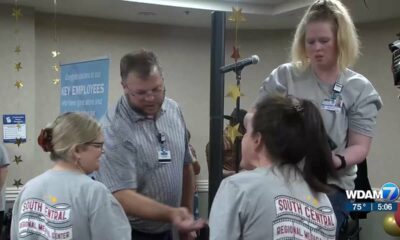Mississippi Today
MSMS student wins NPR podcast competition for her reporting on Jackson water crisis

On Wednesday Georgianna McKenny finally got to share a secret she'd been keeping for weeks: she beat out more than 3,300 students across the country in a national podcast competition.

The 17-year-old is the winner of National Public Radio Student Podcast Challenge, which gives students a chance to have their work featured on the daily national broadcast. Her episode exploring the impact of the Jackson water crisis on students was created in her University Composition class at the Mississippi School for Mathematics and Science, a public boarding school located in Columbus. Her teacher, Thomas Easterling, created the project three years ago in an effort to revamp his coursework after the pandemic.
“It forces them to get out of the classroom and it forces them to see how scholarship and citizenship really are tied,” Easterling said.
The project begins with an essay at the beginning of the year where students describe a place that's important to them, followed by a research paper, usually about a topic related to their home community, that provides the basis for the podcast episode.
McKenny said her initial essay focused on her hometown of Crystal Springs but she ended up writing about the water crisis the more she researched the topic and talked to her family in Jackson.
The drinking water system in Jackson — Mississippi's largest city and home to more than 150,000 residents — has struggled with reliable water pressure for years. The city's water system was on the brink of failure in late August 2023, leaving thousands of capital city residents with low or no water pressure and little information about when service would be restored. The governor declared a state of emergency which was not lifted until late November. The entire city was under a boil water notice for weeks.
The episode begins with McKenny describing the experience of her cousin waking up each morning and checking the tap to see if there was water. Her interviews with her cousin and friends provided the student context for the episode. Easterling connected her with a current Jackson Public Schools teacher who was able to put her in touch with an administrator who spoke anonymously in the episode.
“Some of the stuff they would tell me, I was surprised,” she said. “Maybe it didn't go exactly with my research, or it was just something I never thought about altogether.”
McKenny said she was interested to learn that some schools would combine when a campus had to close due to lack of water pressure, because she assumed the students just wouldn't go to school that day. Her podcast explores the challenges that came with navigating school during this time, including the confusion of teachers and students outside their normal environments and the impact on lunch preparations.
While the project is usually split into a scriptwriter and a producer, McKenny served as both for her project, something she said she enjoyed because it allowed her to fully realize her vision for the project. She said she particularly liked the process of audio editing, but didn't like having to listen to the sound of her own voice.

“Sometimes I would talk too fast or too slow, that was frustrating to listen to it back again and again,” she said.
The competition received over 3,300 entries at the middle and high school levels. Judges praised the creative introduction and personal connection in McKenny's episode.
McKenny said it feels “amazing” to have won, and encouraged others to pursue telling stories they are interested in.
“If anyone is considering making a podcast, writing an article, or just publishing something, they should do it no matter how many people it impacts,” she said. “If they're passionate about it, there's going to be someone who wants to listen.”
This article first appeared on Mississippi Today and is republished here under a Creative Commons license.
Mississippi Today
Renada Stovall, chemist and entrepreneur
Renada Stovall sat on the back deck of her rural Arkansas home one evening, contemplating life when she had a life-altering epiphany…
“I gotta get out of these woods.”
She heard it as clear as lips to her ear and as deep as the trees surrounding her property. Stovall's job as a chemist had taken her all over the country. In addition to Arkansas, there were stints in Atlanta, Dallas and Reno. But she was missing home, her parents and friends. She also knew, she needed something else to do.
“I thought, what kind of business can I start for myself,” said Stovall, as she watered herbs growing in a garden behind her south Jackson home. Some of those herbs are used in her all-natural products. “I know when I lived in Reno, Nevada, where it's very hot and very dry, there really weren't products available that worked for me, my hair, and my skin suffered. I've got a chemistry degree from Spelman College. I took the plunge and decided to create products for myself.”

In 2018, Stovall's venture led to the creation of shea butter moisturizers and natural soaps. But she didn't stop there, and in December 2022, she moved home to Mississippi and got to work, expanding her product line to include body balms and butters, and shampoos infused with avocado and palm, mango butter, coconut and olive oils.
Nadabutter, which incorporates Renada's name, came to fruition.

Stovall sells her balms and moisturizers at what she calls, “pop-up markets,” across the state during the summer. She's available via social media and also creates products depending on what of her ingredients a customer chooses. “My turmeric and honey is really popular,” Stovall added.
“The all-natural ingredients I use are great for conditioning the skin and hair. All of my products make you feel soft and luscious. The shea butter I use comes from West Africa. It's my way of networking and supporting other women. And it's my wish that other women can be inspired to be self-sufficient in starting their own businesses.”





This article first appeared on Mississippi Today and is republished here under a Creative Commons license.
Mississippi Today
On this day in 1954
MAY 17, 1954

In Brown v. Board of Education and Bolling v. Sharpe, the U.S. Supreme Court unanimously ruled that the “separate but equal” doctrine in Plessy v. Ferguson was unconstitutional under the 14th Amendment, which guaranteed equal treatment under the law.
The historic decision brought an end to federal tolerance of racial segregation, ruling in the case of student Linda Brown, who was denied admission to her local elementary school in Topeka, Kansas, because of the color of her skin.
In Mississippi, segregationist leaders called the day “Black Monday” and took up the charge of the just-created white Citizens' Council to preserve racial segregation at all costs.
This article first appeared on Mississippi Today and is republished here under a Creative Commons license.
Mississippi Today
Every university but Delta State to increase tuition this year
Every university in Mississippi is increasing tuition in the fall except for Delta State University.
The new rates were approved by the governing board of the eight universities, the Institutions of Higher Learning Board of Trustees, at its regular meeting Thursday.
The average cost of tuition in Mississippi is now $8,833 a year, a roughly 3% increase from last year. Students can expect to pay tuition ranging from $7,942 a year at Mississippi Valley State University to $10,052 a year at Mississippi State University.
In recent years, universities have cited inflation and rising insurance costs as reasons for the tuition increases. At Thursday's meeting, the board heard a presentation on how property insurance is becoming more expensive for the eight universities as Mississippi sees more tornadoes and storms with severe wind and hail.
READ MORE: Tuition increases yet again at most public universities
But it's an ongoing trend. Mississippi's public universities have steadily increased tuition since 2000, putting the cost of college increasingly out of reach for the average Mississippi family. More than half of Mississippi college students graduated with an average of $29,714 in student debt in 2020, according to the Institution for College Access and Success.
At Delta State University, the president, Daniel Ennis, announced that he will attempt to avoid tuition increases as the regional college in the Mississippi Delta undergoes drastic budget cuts in an effort to become more financially sustainable.
“We will resist tuition increases so that our most economically vulnerable students can continue to have access to the opportunities that a college degree can provide,” he wrote in a memo to faculty and staff on Monday. “We will move beyond basic survival and into a place where we have the capacity to take better advantage of our undeniable strengths.”
Delta State didn't increase tuition last year, either. Officials have been concerned the university is becoming too pricey for the students it serves.
Tuition for the 2024-25 academic year, by school:
- Alcorn State University: $8,105
- Delta State University: $8,435
- Jackson State University: $8,690
- Mississippi State University: $10,052
- Mississippi University for Women: $8,392
- Mississippi Valley State University: $7,492
- University of Mississippi: $9,612
- University of Southern Mississippi: $9,888
This article first appeared on Mississippi Today and is republished here under a Creative Commons license.
-
SuperTalk FM5 days ago
Martin Lawrence making 3 stops in Mississippi on comedy tour
-
Our Mississippi Home4 days ago
Beat the Heat with Mississippi’s Best Waterparks
-
Our Mississippi Home5 days ago
Charlie’s U-Pik: Opening Soon for the Summer Season
-
SuperTalk FM19 hours ago
State auditor cracking down on Mississippians receiving unemployment benefits
-
Mississippi News Video7 days ago
Local dentists offer free dental care in Amory
-
Mississippi News Video3 days ago
Jackson has a gang problem
-
Kaiser Health News4 days ago
Medicaid ‘Unwinding’ Decried as Biased Against Disabled People
-
Mississippi Today7 days ago
On this day in 1968





































